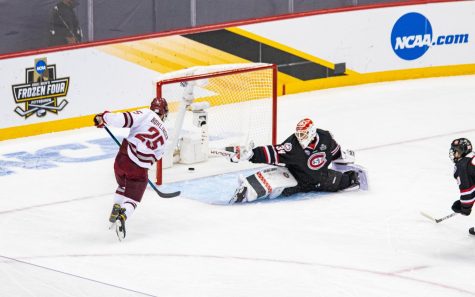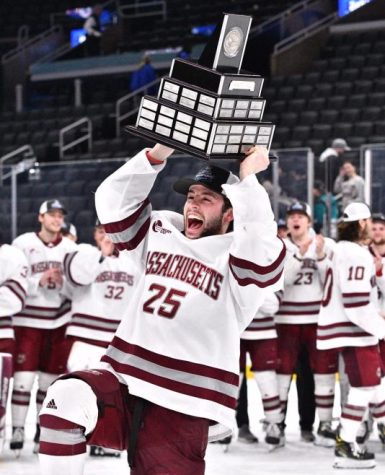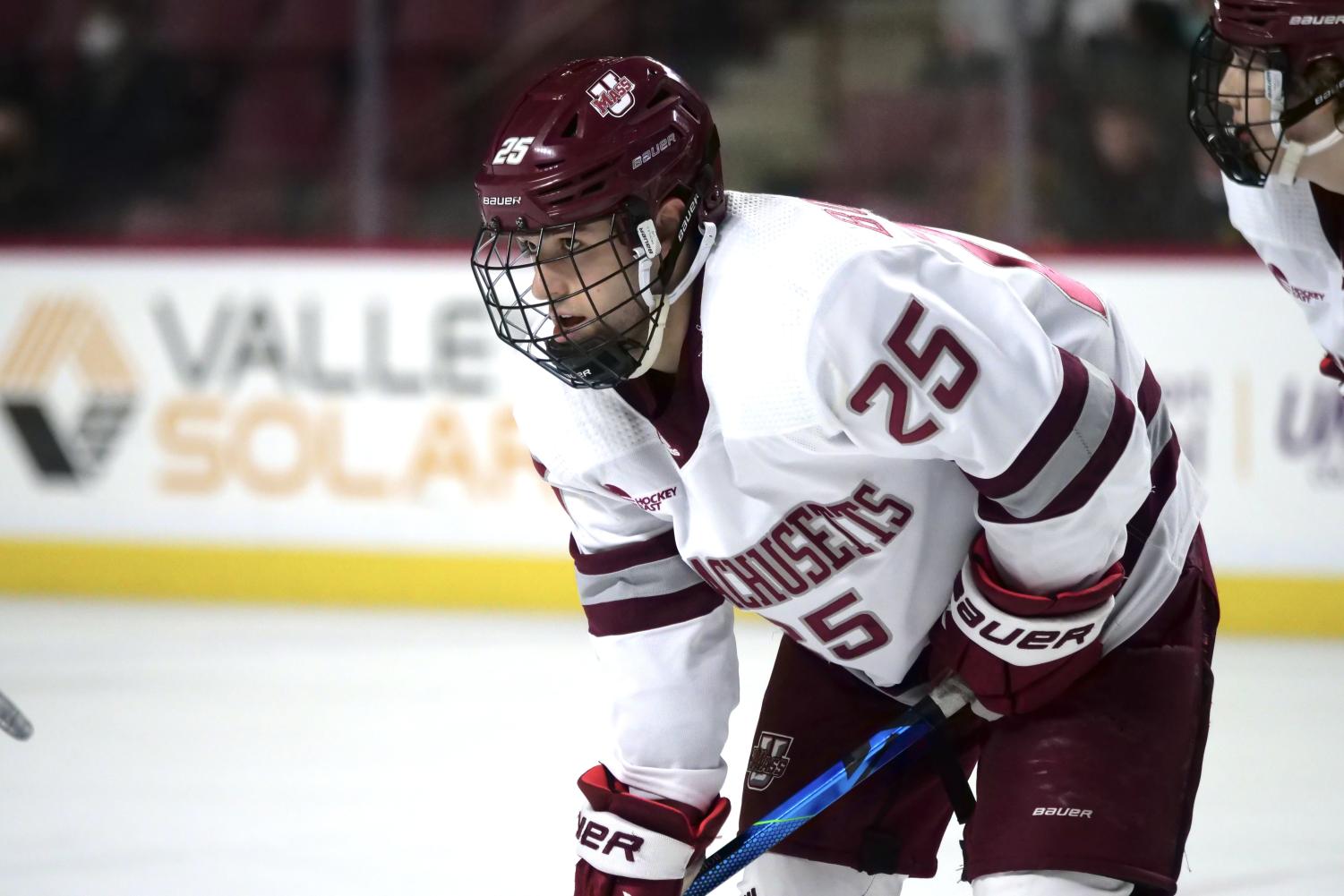‘Do what you can’; how Aaron Bohlinger’s support system fueled his path to recovery
The sophomore defenseman had a long road before becoming ‘Mr. Clutch’
March 24, 2022
It usually started with a text from Aaron Bohlinger to his younger sister, Emma.
“Hey, I just want to go for a drive.”
Windows down. Waiting in the Dunkin Donuts drive through line. Music blasting. “I’m a believer,” from Shrek, was always one of their favorites — Aaron’s especially. If not that, then any country music would do the trick.
Sometimes Aaron talked over the noise and vented to Emma about anything that was going on in his life. Other times he’d just sing right along with the music. Or some mixture of both. Regardless, those were the moments Aaron needed during a difficult time in his hockey career.
For Aaron, talking through it usually helped.
“I think those conversations have to be had where you can ask a guy if he’s O.K. and sometimes it might not be a ‘yeah, I’m alright’,” Bohlinger’s defensive partner Colin Felix said. “The more in depth you get with those conversations and try to make them feel like a part of the team, the better [it is] mentally and physically for them to continue to progress.”
Aaron has three career goals in his two seasons with the Massachusetts hockey team. Included in the three are two of UMass’ biggest postseason goals ever. One, a momentum shifting score in the 2021 national championship game. The other, an overtime game winner giving the Minutemen their second straight Hockey East championship.
Bohlinger played through some pain for much of his freshman year, dealing with an ankle injury that came up while he was still in the USHL before he got to campus. But he didn’t let that stop him from making an impact on the ice. He went from a young and inconsistent blue liner to one of the smartest players with and without the puck on his stick. By the end of the season it was only a matter of time before he made a name for himself.
In the national championship game against St. Cloud State, Bohlinger was opportunistic with his chances. He made a defensive play in the first period that allowed him to take control of the puck in the neutral zone, as soon as he saw two defenders crash into each other he turned on the jets and glided down the ice. Nobody could catch him.
He passed to a trailing Ryan Sullivan, who put it right back on Bohlinger’s tape for a tap-in goal to open the scoring in the title game. That day became the most important one of Bohlinger’s entire hockey career. It started with an unforgettable goal and ended with the highest team honor in college sports: an NCAA championship trophy.

When the excitement from reaching the pinnacle of college hockey wore off though, the pain in his ankle did not.
“He was able to play the whole season, but he wasn’t himself,” Aaron’s dad, John Bohlinger said.
After the season ended, Bohlinger underwent offseason surgery on his lingering ankle injury and entered his recovery process. His training program looked a little different from all his teammates; the following five months were much more focused on rehabilitation and returning to peak physical condition than improving on the ice.
“You never want to miss any time, but it was something I knew I had to get done,” Bohlinger said. “It had been nagging for a while.”
The timetable for recovery from a physical injury isn’t always straightforward, but the mental aspect of being away from the game can also take a toll on athletes. Aaron wasn’t immune to that struggle; being away from the ice meant feeling like he wasn’t doing everything he could to help the team, and it also caused him to feel disconnected at times.
At first, Bohlinger thought it would just be a short time away. He was fine with playing through pain if it meant that he could be on the ice. Having that long duration finally sink in was mentally disheartening, and being told he couldn’t play was the last thing he wanted to hear. Bohlinger started skating when he was three and played hockey ever since. He travelled all over the country for the game that he loved, and now he had to live without it, and he wasn’t sure how long he’d be on the bench for. During those moments, he leaned on the support systems around him to help him get through the tough times.
Bohlinger has always been a family man; he was raised to have a very tight-knit relationship with his parents, John and Wendy, and younger sister Emma. Those relationships only grew stronger once he became serious about hockey. Long trips in the car heading to tournaments brought the family closer together, both physically and emotionally.
When Aaron faced mental challenges, his family was naturally the first people he went to for advice or even just to talk through his problems. Emma especially.
When it was time for Emma to search for colleges, there wasn’t a place she’d rather be than at UMass with her brother. She worried about how he might react to her wanting to go to the same school but that hesitation quickly melted away.
“He was so excited for her to be there, and that [call] made her day,” Aaron’s mom, Wendy Bohlinger said of his reaction to Emma’s news.
Emma and Aaron meet every week for lunch — usually at the Hampshire dining common on campus — to talk about college, hockey and anything they can think about. Anything either sibling needs, they know the other has their back.
Talking through mental struggles is important, it’s something that the entire Bohlinger family, along with UMass coach Greg Carvel and his coaching staff, all stressed to Aaron during the challenging days. Whenever Aaron’s physical pain or mental health started to get to him, he had to take a deep breath and find someone to sit down and talk to.
“You have to get those things out on the table,” John Bohlinger said. “It feels good for the person that’s having the trouble to talk about it, and we’ve always told both of our kids, ‘no matter what it is, you can come talk to us’ … that’s what our job is.”
Aaron never shied away from talking to his parents on the phone, and he embraced all the help they gave him. Both John and Wendy had their own sayings to help him get through days, and even though they sounded cliché, those words of encouragement, to “keep the faith” and know that “everything happens for a reason” moved mountains for him.
On top of leaning on his family, Aaron also had his entire extended hockey family looking out for him. He spends nearly his entire day around teammates, especially his sophomore class. The bond that he built with Josh Lopina, Oliver MacDonald, Linden Alger, Ryan Sullivan and Henry Graham will last a lifetime. As his teammates, friends and for some of them as roommates, they saw every step of Bohlinger’s recovery. They saw every setback physically and mentally, and they did whatever they could to help him through dark days.
From going on golf trips in the summer, to staying home watching movies and grabbing a late night bite from the Worcester dining hall, that group spends the majority of their days together. The goofy moments helped Aaron take his mind off the physical and mental obstacles, but he knew that his teammates were always there for the serious conversations as well. Through every up and down, they always had Bohlinger’s back.
“They’re not even best friends, they’re brothers,” Emma said of the relationship Aaron has with the sophomore class of Minutemen. “They’re going to be uncles for each other’s kids, they’re going to be around for as long as long as they’re alive.”
“Their relationship is one like no other, they’re 21 year old boys but when they’re together they’re like kids in a candy store.”
As Bohlinger returned to the ice in mid-October 2021 — a few games after the season started — he was relieved. He only missed two games, but including the entire offseason on a separate schedule, the time away felt far too long. He wasn’t at 100 percent but he wanted to be out there again, so he followed advice given by coach Carvel, and four words stuck out most as he got his body prepared for game action again: “do what you can.”
“Something I’ve talked to Carvel about is just trying to go out there and give our best every time,” Bohlinger said. “The saying we use a lot is ‘go out there and do what you can’, don’t worry about anything and just let the chips fall where they may.”
Bohlinger did whatever he could, but he didn’t completely dodge setbacks to his recovery process. Shortly after his initial return to the lineup, a hard bump into the boards sent Aaron back away from the ice for two more games. It wasn’t a long period of time, but regardless, wasn’t the news Aaron was hoping to hear. He worked so hard for months to prepare his body to return, and it was a crushing blow to find out that he’d have to sit out any longer.
Aaron needed a few more long talks with Emma to cope.
Once he accepted the mental aspect of that setback, he got his body prepared for games again. Bohlinger got good at doing the little things to put him in a position to play. He came in for treatment before practice, stayed for extra treatment after, and took care of his body as much as possible. In the eyes of Cal Kiefiuk and Colin Felix, he was a “total pro.”
Because of all that work Bohlinger put in behind the scenes, no matter where he was at physically, if he wanted to play and was cleared to play, Carvel allowed it.
“I’ve tried to just have those conversations with him that you’re not going to be 100 percent [physically], but your attitude can be 100 percent,” Carvel said. “I have a lot of faith and trust in him. Guys like that, you just keep throwing them out on the ice.”
Three months later, heading into a weekend series against Vermont in February, Bohlinger was trending in the right direction with his health and his play on the ice. He was back in the lineup consistently, making plays on the defensive end and starting to generate a few assists. But he still hadn’t found the back of the net since returning, and Carvel wanted that to change.
The UMass coach told Bohlinger before the Feb. 26 game against the Catamounts that he could feel a goal coming. He helped manifest that, and Aaron potted a goal in the third period on a power play. When his teammates saw the puck hit the netting, they all jumped from their seats on the bench and loudly celebrated Bohlinger’s “welcome back” moment.
On the Tuesday before the Hockey East championship weekend, Bohlinger talked a lot about the feeling he had scoring his first goal of the season and second of his career. The tally was meaningless to the outcome of the game, UMass was already well ahead on the scoreboard and Vermont showed no signs of coming anywhere close to a comeback. But for Bohlinger, it represented a year of hard work, ups-and-downs, frustrations and elation.
It was a reaffirming moment that Bohlinger was fully back. He was physically capable and mentally more confident than ever. He added something else on that Tuesday when he thought about the significance of his first goal back.
“Hopefully I got a few more in me before the end of the year.”
Four days after speaking those words, Bohlinger showed that he did have at least one more in him. He found an opening in overtime against UConn and Bobby Trivigno backhanded a pass towards the center of the ice while his face was jammed into the boards. But it found Bohlinger. All the defenseman needed was a little bit of space, and he scored for the third time in his career.

That goal allowed Bohlinger to hold high his third major trophy and score his second high-impact goal, all roughly 12 months apart from each other. Bohlinger’s name will forever be etched into the history of UMass hockey because of those moments, and he even earned a new nickname in the locker room: “Mr. Clutch.”
It’s easy to imagine that the sophomore defenseman would be feeling like he was on top of the world for the past 12 months. But every rose has its thorn, and Bohlinger dealt with his share of challenges between the two biggest highlights of his career. He recognized that his personal path to that success wasn’t easy, but whenever he needed someone to lean on, he knew the people that had his back every step of the way.
“My family is just amazing, they dealt with me when I was pretty miserable at times throughout the process, so I’m super grateful for them,” Bohlinger said. “The support system is huge for getting through it, there’s still dark days, but you can definitely get through it, you just have to talk to people.”
Colin McCarthy can be reached at [email protected] and followed on Twitter @colinmccarth_DC.

MacDonald Bruce • Mar 24, 2022 at 10:46 pm
Great Article, so happy for Aaron to get through the ups and downs of his last two years.